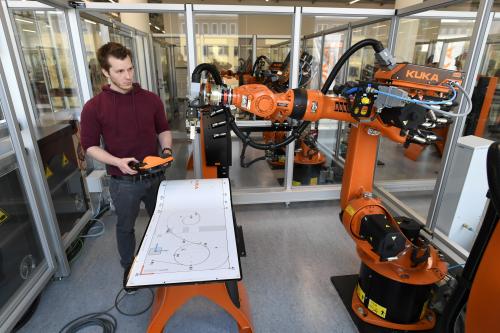This is the first blog in a three-part Future Development series on technological change in Europe, digital technology and productivity gaps, and Greece’s digital future.
If the biggest disrupter of the last few decades was Deng Xiaoping—the father of modern China—the big disrupter of the next few decades may well be John McCarthy. McCarthy, an American professor of Computer Science, is believed by many to be the father of artificial intelligence. Interestingly, the two have an epiphany in common. In 1979, Deng, a lifelong communist, visited the United States and came back a believer in market capitalism. In 1968, after a two-day visit to Czechoslovakia, McCarthy, who was raised as a communist by his immigrant parents, became a free-market Republican.
The ideas of computer scientists and mathematicians like McCarthy are radically transforming the way we communicate, and the way we make, buy, and sell goods and services. The changes will likely be so great that societies will have to reorganize government policy—rethinking how to regulate, what to subsidize, and whom to tax.
Change comes to Europe, again
Nowhere are these changes being considered more seriously than in Europe, where the technological transformations collectively called “Industry 4.0” are not unprecedented. At the end of the 19th century, as the Second Industrial Revolution unfolded in Western Europe, it brought mass unemployment in the countryside and squalor in the cities. Machines replaced peasants, who fled to cities and became the new urban poor. As they found new employment, mostly in the urban industrial sector, they joined a growing middle class. They would eventually transform Europe into a continent with the highest standards of living in the world.
A century later, Industry 4.0 technologies again threaten to replace their descendants with machines. But this time, Europe is a very different place. Europeans have changed from colonizers to traders, and the European Union replaced a clutch of warring nations. So even though technological change has precedent, it brings unprecedented imperatives. The European economic model puts a premium on social solidarity, and the European Union on political integration. Finding a way to remain competitive while juggling these social and political objectives has not been easy. Now Europe faces new questions. Will the new wave of digital technologies make this balancing act easier or impossible? Are Europeans better equipped than Asians and Americans to manage the trade-offs, or are these technologies coming when Europe is least prepared for them?
In Europe 4.0, a World Bank research and policy project that we started earlier this year, we hope to answer these questions. Based on the work that we’ve completed, Europe’s workers, consumers, businesses, and policymakers will have to learn a new alphabet that will allow them to cohabit with these technologies. The ABC of the new world is Algorithms, Big data, and the Computer chip.
All technologies are not created equal
Today, there are more bits of data on Earth than grains of sand. Even though less than 1 percent of available data is actually being used, the leading companies are all data (or “tech”) companies. This is new. In 2000, there were three tech companies among the top 10 most valuable companies in the world. Today, the top seven are all tech companies: Five are American, two Chinese, none are European.
“So what?” you might ask. For one, it means that Europe is missing out on big profits. Data companies have significantly higher operating margins than traditional companies—20 percent higher, by one estimate. Higher profit margins inevitably mean bigger market shares. Europe risks being locked out of this new economy. With that will come a decline in economic power, and declining global influence. Most Europeans will not take this well. Nor should they.
Like most things in economics, the drivers of this new data economy are costs. A closer look reveals that the new technologies are cutting three types of costs. The first is the cost of computing which has fallen so dramatically that almost everyone in Europe now has an affordable supercomputer in their pockets. The second is the decline in the cost of matching demand and supply through low-cost transaction platforms, such as Uber and Airbnb, or Fintech innovations like Kenya’s MPESA. The third is the cost of substituting workers with (much less fussy) robots. Robots are already common in parts of manufacturing such as automobiles, and becoming ever more ubiquitous in logistics and transportation.
Europe 4.0 organizes these technologies into three types (Figure 1):
- Informational technologies that exploit the exponential growth of data. Examples include the internet of things, big data analytics, and cloud computing. The fundamental driver is the falling cost of computing. The main effect is to lower coordination costs.
- Transactional technologies that digitize business models. Examples include the sharing economy, gig economy, digital platforms, and blockchain. The fundamental driver is the falling cost of matching demand and supply. The main effect is to reduce information asymmetries.
- Operational technologies that combine data with automation. Examples include robotics, 3D printing, artificial intelligence, and machine learning. The fundamental driver is the falling cost of routine functions. The main effect is to reduce labor costs by automating activities.
Figure 1: Industry 4.0 technologies
It is not clear whether these technologies will lead to greater concentration of production in leading regions or countries, or in larger enterprises that use more capital-intensive forms of production. For Europe, it matters a lot whether they do.
A simple framework for Europe (and other places)
At present, Europe has a moderately strong presence in informational and operational technologies, but it is lagging in transactional technologies. Figure 2 summarizes our working hypotheses regarding the effects of Industry 4.0 technologies on Europe’s objectives of economic competitiveness, social inclusion, and political integration. Policies to encourage the adoption of informational technologies are likely to help with all three policy goals. Adopting new transactional technologies such as digital platforms will aid competitiveness and possibly help with social inclusion, but will likely lead to economic concentration in leading countries and regions. Operational technologies may be even more socially and spatially polarizing.
Figure 2: Industry 4.0 technologies and Europe’s policy objectives
Industry 4.0 technologies are likely to be viewed quite differently in developing countries that care mostly about economic competitiveness (think China) compared with advanced economies like the United States where economic competitiveness and social inclusion are both important policy objectives. Spare a thought for the European Union, which must juggle the three objectives all at once.
The Brookings Institution is committed to quality, independence, and impact.
We are supported by a diverse array of funders. In line with our values and policies, each Brookings publication represents the sole views of its author(s).










Commentary
A new alphabet for Europe: Algorithms, big data, and the computer chip
April 18, 2019